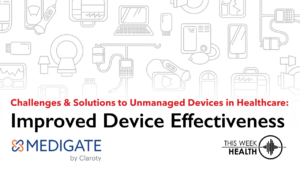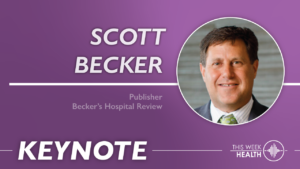

September 1, 2022

August 26, 2022
October 13, 2025
Healthix has appointed Inderpal Kohli as the new Chief Technology Officer, tasked with leading the company's initiatives in technology modernization and data intelligence. His leadership is anticipated to enhance Healthix's capabilities in managing health data and fostering innovation in the healthcare sector. The positive reception from industry professionals on platforms like LinkedIn underscores the confidence in Kohli's potential to drive significant advancements in healthcare technology. This strategic appointment signals Healthix's commitment to navigating the evolving health data landscape effectively.
Healthix Appoints Inderpal Kohli as CTO to Drive Innovation Healthix
October 13, 2025
In 2025, U.S. healthcare organizations face heightened cybersecurity risks, as recent reports underscore an increase in frequency and severity of cyberattacks disrupting patient care and contributing to clinical risks. Key findings indicate that human factors, particularly employee negligence and leadership gaps, play a substantial role in these breaches, underscoring the need for targeted training and governance in healthcare IT. However, advancements in artificial intelligence offer promising solutions by bolstering defenses and optimizing budgetary allocations for security measures. As predictions suggest an escalation in breaches, healthcare professionals must prioritize cybersecurity to safeguard patient safety and protect sensitive data.
AI Enhances Cybersecurity Amid Rising Threats to U.S. Healthcare Systems Healthcare IT News
October 13, 2025
Hackers from the Crimson Collective have breached Red Hat, compromising over 28,000 code repositories and threatening to release 570 GB of sensitive data unless a ransom is paid. This includes critical consulting engagement information, access tokens, and reports on major corporate networks, potentially impacting clients like Walmart and American Express. The incident underscores the vulnerabilities present in software supply chains and raises significant concerns for healthcare technology providers, who often rely on such systems for patient data management. With ongoing threats from ransomware groups, healthcare organizations must bolster their cybersecurity measures to protect sensitive information from similar breaches.
Crimson Collective Hacks Red Hat, Threatens to Expose 570GB of Data Cybersecurity Dive
October 13, 2025
A recent report by Trilliant Health reveals significant disparities in payment rates between academic medical centers and safety net hospitals in the U.S., highlighting the opaque practices that contribute to fraud, waste, and abuse in the healthcare system. Despite providing the same level of care, academic institutions often secure much higher reimbursement rates, which are attributed to their complex cost structures and resource availability. This disparity exacerbates inequities among healthcare providers and complicates access for underserved populations, underscoring the urgent need for improved transparency in payment practices. Addressing these issues is essential for healthcare professionals to foster a more equitable and efficient system.
Report Uncovers Stark Payment Disparities in U.S. Healthcare System MedCity News
October 13, 2025
Healthix has appointed Inderpal Kohli as the new Chief Technology Officer, tasked with leading the company's initiatives in technology modernization and data intelligence. His leadership is anticipated to enhance Healthix's capabilities in managing health data and fostering innovation in the healthcare sector. The positive reception from industry professionals on platforms like LinkedIn underscores the confidence in Kohli's potential to drive significant advancements in healthcare technology. This strategic appointment signals Healthix's commitment to navigating the evolving health data landscape effectively.
Healthix Appoints Inderpal Kohli as CTO to Drive Innovation Healthix
October 13, 2025
In 2025, U.S. healthcare organizations face heightened cybersecurity risks, as recent reports underscore an increase in frequency and severity of cyberattacks disrupting patient care and contributing to clinical risks. Key findings indicate that human factors, particularly employee negligence and leadership gaps, play a substantial role in these breaches, underscoring the need for targeted training and governance in healthcare IT. However, advancements in artificial intelligence offer promising solutions by bolstering defenses and optimizing budgetary allocations for security measures. As predictions suggest an escalation in breaches, healthcare professionals must prioritize cybersecurity to safeguard patient safety and protect sensitive data.
AI Enhances Cybersecurity Amid Rising Threats to U.S. Healthcare Systems Healthcare IT News
October 13, 2025
Hackers from the Crimson Collective have breached Red Hat, compromising over 28,000 code repositories and threatening to release 570 GB of sensitive data unless a ransom is paid. This includes critical consulting engagement information, access tokens, and reports on major corporate networks, potentially impacting clients like Walmart and American Express. The incident underscores the vulnerabilities present in software supply chains and raises significant concerns for healthcare technology providers, who often rely on such systems for patient data management. With ongoing threats from ransomware groups, healthcare organizations must bolster their cybersecurity measures to protect sensitive information from similar breaches.
Crimson Collective Hacks Red Hat, Threatens to Expose 570GB of Data Cybersecurity Dive
October 13, 2025
A recent report by Trilliant Health reveals significant disparities in payment rates between academic medical centers and safety net hospitals in the U.S., highlighting the opaque practices that contribute to fraud, waste, and abuse in the healthcare system. Despite providing the same level of care, academic institutions often secure much higher reimbursement rates, which are attributed to their complex cost structures and resource availability. This disparity exacerbates inequities among healthcare providers and complicates access for underserved populations, underscoring the urgent need for improved transparency in payment practices. Addressing these issues is essential for healthcare professionals to foster a more equitable and efficient system.
Report Uncovers Stark Payment Disparities in U.S. Healthcare System MedCity News

Questions about the Podcast?
Contact us with any questions, requests, or comments about the show. We love hearing your feedback.

© Copyright 2024 Health Lyrics All rights reserved